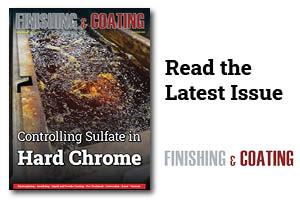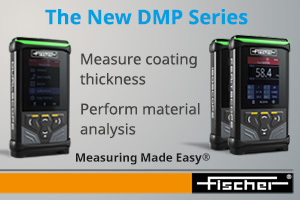Every manufacturer who buys a new coating line for their production system wants one that applies the best, most corrosive-resistant finish they can achieve.
However, when a manufacturer wants to increase production exponentially, too, that calls for a bigger set of challenges to meet quality needs and production goals.
Delco Trailers in Brookston, Texas, asked Total Finishing Systems to do this. Delco Trailers makes light—to medium-duty steel trailers, including dump and gooseneck decks over, and offers tailored equipment and steel cargo.
With a dealer network of over 180 locations in the U.S., Delco Trailers has grown from an initial 4,800 square foot facility in 2006 —making about eight trailers a week — to more than 180,000 square feet by 2020 that they had already outgrown.
New Coating Line for New 600,000 Square Foot Location
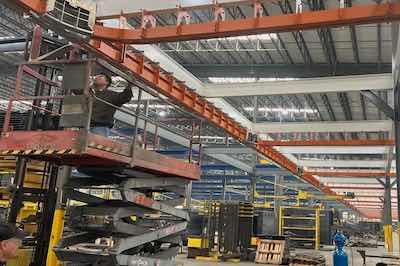 Total Finishing Systems built an automated powder coating line for Delco that measures over 9,500 feet.With plans to build a facility that was almost three times its current operations and move into a 600,000 square feet location in 2023, Delco Trailers also wanted to increase its production to at least 500 units a week, which called for a coating system that could keep up with that demand.
Total Finishing Systems built an automated powder coating line for Delco that measures over 9,500 feet.With plans to build a facility that was almost three times its current operations and move into a 600,000 square feet location in 2023, Delco Trailers also wanted to increase its production to at least 500 units a week, which called for a coating system that could keep up with that demand.
”They didn't want to take the old coating line with them,” says Andrew Cardenas, Operations Manager at Total Finishing Systems. “They wanted a new system essentially built into the building, so the building would go with it hand-in-hand with the new coating line.”
Installing a sizeable automated powder coating line—over 9,500 feet—required ingenious design and build capabilities by Total Finishing Systems, which specializes in high-production painting systems, including turnkey liquid paint and powder coat finishing systems.
Total Finishing Systems has a history of partnering with large-scale, high-production manufacturers, automotive Tier 1 and Tier 2 plants, and well-known aerospace and defense companies.
Ramping Up Production to 500 Units Per Week
 Ty CrowderManagers from Delco Trailers approached Total Finishing Systems a few years ago about designing and building the new powder coat system. It wasn’t something that TFS had done many times before, but the throughput certainly caught their attention.
Ty CrowderManagers from Delco Trailers approached Total Finishing Systems a few years ago about designing and building the new powder coat system. It wasn’t something that TFS had done many times before, but the throughput certainly caught their attention.
“Delco aimed to coat around 500 trailers per week, which is an ambitious target that required an increase in production capacity,” says Ty Crowder, President of Total Finishing Systems.
Cardenas says one of the project specifications was that the new line needed to make stops along the way to allow the powder coating team proper dry time and curing.
“ The cleaning is automated, and it's a continuous movement through the washer and the dry oven,” he says. “It stops before that for staging and masking, and then it would go into a powder booth.”
 Andrew CardenasThe system has a downdraft powder booth, and parts go into the cure oven. The oven was originally designed to be a two-stop cure oven but was modified.
Andrew CardenasThe system has a downdraft powder booth, and parts go into the cure oven. The oven was originally designed to be a two-stop cure oven but was modified.
“Depending on the number of trailers they have on the line, they can make more stops,” Cardenas says. “And depending on the size of trailers they have, they can do more.”
Numerous Loadings / Unloading Automated Zones
In total, 27 loadings and 27 unloading automated zones were built into the line to ensure a continuous and organized workflow. Previously, Delco’s team had to move the trailers manually — or with forklifts — from a production and welding area to a storage area until it was time to be placed on the coating line.
With the new automated system that Total Finishing Systems helped design and install, an overhead crane automatically takes the parts from the welding stations to the coating area. This step significantly reduces the labor needed, speeding up turnaround times and improving productivity.
The system uses asynchronous conveyors—often called ‘power and free’ overhead conveyors—because they allow loads to move along the coating line at different speeds. Loads can start and stop independently and even change tracks if needed.
When the parts arrive at the coating area, they undergo a mechanical pre-treatment by shot blasting the parts and then bifurcating as some parts continue to the 3-stage pretreatment system and into a drying oven. At the same time, others go to a blow-off area for manual cleaning and drying.
“Because of the constraints with the pit depth, we had to design the washer to sit essentially suspended in the air with the correct amount of supports. The washer housing holds the weight of the conveyor, the weight of the part, and just about everything. It was challenging to design and come up with ways to ensure they could hit all of the parts they wanted for this process.”
The conveyor system then branches to take each part to the correct booth. The two lines feature two adjacent booths for primer application and two for powder coating application. Each booth is 160 feet long and includes a powder recovery system with a cyclone. After coating, the components reach the two adjacent curing ovens.
Eventually, the two finishing lines merge again into a single chain, sending the parts to the unloading area.
Overcoming Obstacles in the Design Phase
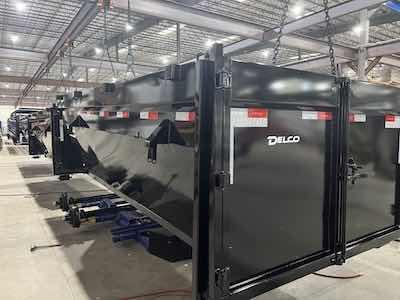 Delco aimed to coat around 500 trailers per week, a major increase in production.Cardenas says Total Finishing Systems had to overcome several difficulties when they were hired to design and install the system.
Delco aimed to coat around 500 trailers per week, a major increase in production.Cardenas says Total Finishing Systems had to overcome several difficulties when they were hired to design and install the system.
“The challenge we faced was staying within the limits of the buildings pits that were already built-in,” he says. “We had to keep everything at uniform heights since we couldn't have height changes.”
Cardenas says the washer was also a challenge because the washer housing sits about 6 feet above the tanks. Total Finishing Systems had to elevate the washer housing while the tanks sat in a pit that measured eight by 8 feet. Each stage has two pumps, and there are two different sets of risers in each stage.
“There are the traditional ring risers that encapsulate the inside and outside of the trailer,” he said. “However, long throw nozzles have their own set of risers in the wash stations that would hit when they wash their horse trailers. So we needed to make sure they spray up inside the part at roughly seven feet and need to spray vertically.”
Total Finishing Systems had to design a separate set of nozzles with separate pumps that would turn on when those trailers reached the washer stage, which would kick on the second pump automatically.
“We were willing to bend the design rules a little bit at the front to get what they wanted.”
“Because of the constraints with the pit depth, we had to design the washer to sit essentially suspended in the air with the correct amount of supports,” Cardenas says. “The washer housing holds the weight of the conveyor, the weight of the part, and just about everything. It was challenging to design and come up with ways to ensure they could hit all of the parts they wanted for this process.”
Tailor-Made Design Pays Off for Manufacturer
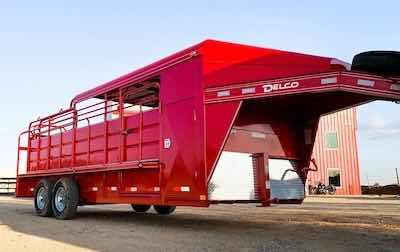 Crowder says the design of the Delco Trailer coating system was tailor-made from the start.,
Crowder says the design of the Delco Trailer coating system was tailor-made from the start.,
“We fully customized it to meet the precise requirements of the customer, which had a detailed vision of how to organize production,” he says. “Despite the system’s imposing size, there was little space available. We had to use every square foot very carefully.”
The final coating system has a definite collaborative feel. Total Finishing Systems designed the system and booths, and Erzinger from Brazil supplied the powder recovery system. Railtechniek from the Netherlands installed the power and free conveyor. Total Finishing Systems also designed the pre-treatment tunnels and the drying and curing ovens and integrated all technologies.
Cardenas says the scale of the project and all of the challenges made for a very satisfying experience for the Total Finishing Systems team as it worked with Delco Trailers to tailor the new coating line to their exacting specifications, as well as working with different manufacturers of the components for the system.
”We were willing to bend the design rules a little bit at the front to get what they wanted,” he says. “Then we had to go back to the drawing board and ask, ‘Can what we promise them be done?’ And the answer we kept getting from our team was, ‘Yes, we can.’ And that made the achievement even more exciting and satisfying.”






